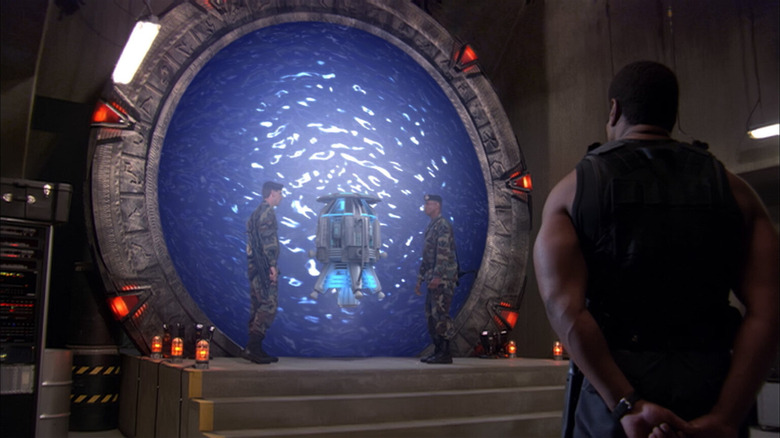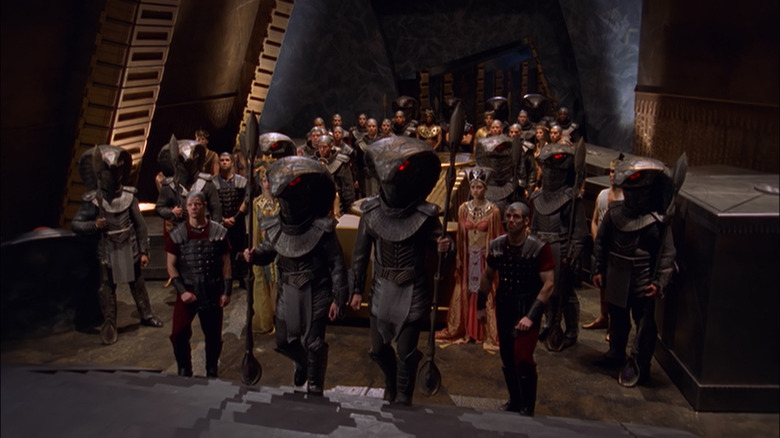When a beloved, long-running sci-fi series is abruptly canceled, like Brad Wright and Jonathan Glassner’s “Stargate SG-1,” it is natural for the fanbase to feel festering discontent. Premiering on Showtime in 1997, “Stargate SG-1” aired its series finale in 2007, just a few days after its milestone episode — titled “200” — was released, which celebrated the show’s tendency to swerve towards incredibly eccentric ideas that somehow always found a way to stick the landing. Of course, Roland Emmerich’s 1994 sci-fi adventure film “Stargate” had sown the seeds for the franchise (despite plans for two more films falling through), granting fans the unique opportunity to unravel the mysteries surrounding the titular artifact through a spin-off series that ran for almost 10 years.
So, what was “Stargate SG-1” about? The series picks up roughly a year after the events in Emmerich’s movie, by which point the titular artifact has become common knowledge among the masses and the U.S. government has leveraged it to traverse distant worlds. An elite U.S. Air Force squad named SG-1 is deployed with the intention of warding off alien attacks, as the dark forest hypothesis comes into play with access to galactic civilizations both benign and malignant. The Goa’uld, the Replicators, and the Ori emerge as key threats to Earth, and the series draws heavily from history and mythology to weave intriguing cultural tapestries that intertwine, and often clash, with our own.
However, this well-oiled machine, which often ran on fumes due to budgetary constraints or a dearth of fresh creative directions, came to a halt in August 2006, when the Sci-Fi Channel (where the show had migrated to in 2002), announced that there would be no 11th season. Speculations about dwindling ratings, ever-expanding production costs, and poor marketing were cited to justify this cancellation. However, the real reason “Stargate SG-1” was axed can be traced to a network decision that had little to do with such logistical aspects. But what happened, exactly?
Sci-Fi’s Stargate SG-1 went out with a bang
In a now-archived interview with Variety, Mark Stern, former exec VP of original programming for the Sci-Fi Channel (now known as Syfy), clarified that “SG-1” cancellation was not ratings-based. “[The cancellation] was not a ratings-driven decision. We’re actually going out on a high note,” Stern said, while affirming that the cast and crew were given enough time to wrap up the narrative in a satisfactory manner, with all loose ends tied up in the series finale. Well, two things can be true at once, as the ratings for the show had dwindled (per the Variety report), but the margin wasn’t signification enough to warrant a cancellation due to that reason alone, at least according to network television standards at the time.
The end of “Stargate SG-1,” however, did not mean the end of the franchise, as “Stargate Atlantis” — the spin-off series for “SG-1” — ran for five seasons between 2004 and 2009. “Atlantis” picks up after the parent series’ seventh season, where the discovery of an Antarctic outpost leads the core team to the legendary city of Atlantis, thought to be constructed by an ancient alien race. Apart from some “SG-1” regulars joining the cast of “Atlantis” down the line, the showrunners made two direct-to-DVD films: “Stargate: The Ark of Truth” and “Stargate: Continuum.” While “The Ark of Truth” situates itself snugly between the events of “SG-1” and “Atlantis” (with the cast of “SG-1” returning), “Continuum” features an alternate timeline where the Stargate program on Earth never existed, leading the OG SG-1 team (who are the only ones to remember the original timeline) to try and reinstate it at all costs.
Although there are no “Stargate” projects in production at the moment, it is a beloved franchise that can be rebooted at any time, given the vast amount of potential that its fascinating premise holds. That being said, nothing comes close to “Stargate SG-1,” which dared to embrace a high-minded concept and cast in the mold of longevity while taking us on adventures across the galaxy and beyond.









